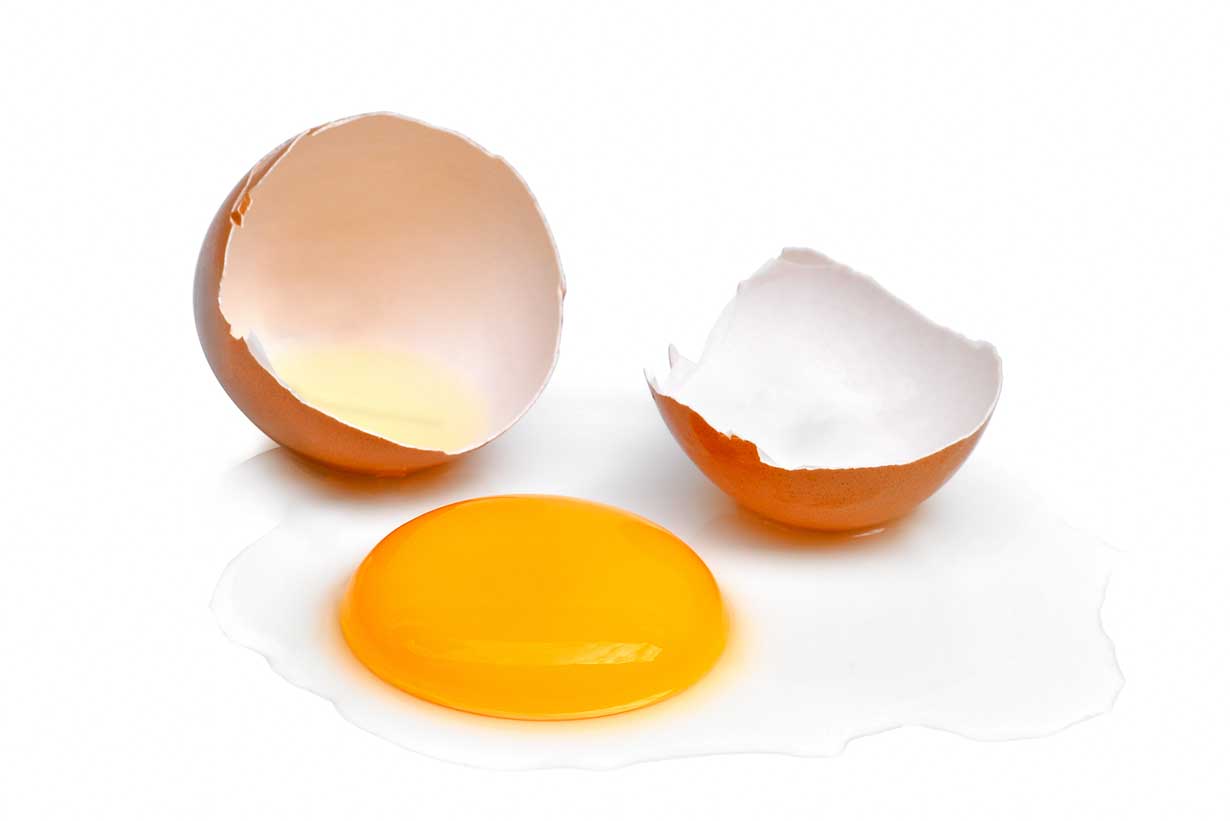All eggs contain a wide range of nutrients, so why do some people opt for egg whites? There are some clear differences between the two, as you’ll learn in this article.
First, we’ll provide a complete nutritional breakdown of how egg whites and whole eggs compare, covering everything from their nutrients to their potential health effects. Following the comparison, we’ll look at what might make each option the better choice for you.
Key Differences Between Egg Whites and Whole Eggs
- Calories and protein: Egg whites contain more protein per calorie than whole eggs, making them a better choice for protein density.
- Fat and cholesterol: Whole eggs contain more fat, saturated fat, and cholesterol. Considering these differences, they are more likely to impact cholesterol levels compared to egg whites.
- Vitamins and minerals: A high proportion of an egg’s vitamins and minerals are found in the yolk; whole eggs provide a greater range of essential nutrients.
Important Note: The content in this article is for informational and educational purposes only. It should not replace medical advice from your healthcare provider.
Table of contents
Egg Whites vs. Whole Eggs: A Nutritional Comparison
First, let’s directly compare the nutrients present in whole eggs and egg whites.
Within this section, we’ll look at how they compare for calories, fat, protein, vitamins, minerals, dietary cholesterol, and carotenoid content.
Note: Neither egg whites or whole eggs provide a meaningful amount (or difference) of carbohydrates, so they are not featured in this direct comparison.
The data will be presented for cooked eggs, with values provided per 100 grams and per large egg. All nutritional data is sourced from the USDA’s FoodData Central database (1, 2).
Calories
| Type of Egg | Calories |
|---|---|
| Egg White (100 g) | 52 kcal |
| Whole egg (100 g) | 143 kcal |
| 1 Egg white (33 g) | 17 kcal |
| 1 Whole Egg (50 g) | 72 kcal |
As the table shows, whole eggs contain around 2.75x more calories per 100 grams than egg whites.
Compared to one egg white, a whole egg has about four times more calories.
Fat
| Type of Egg | Total fat | Saturated fat | Unsaturated fat |
|---|---|---|---|
| Egg White (100g) | 0 g | 0 g | 0 g |
| Whole egg (100g) | 9.96 g | 3.2 g | 5.45 g |
| 1 Egg white (33g) | 0 g | 0 g | 0 g |
| 1 Whole Egg (50g) | 4.98 g | 1.6 g | 2.73 g |
Unlike whole eggs, egg whites contain no appreciable fat content.
Whole eggs contain close to 5 grams of fat per large egg, 1.6 grams of which is saturated.
Protein
| Type of Egg | Protein |
|---|---|
| Egg White (100g) | 10.67 g |
| Whole egg (100g) | 12.4 g |
| 1 Egg white (33g) | 3.52 g |
| 1 Whole Egg (50g) | 6.2 g |
Since both egg whites and yolks contain protein, whole eggs offer more protein per gram, with slightly over 12 grams per 100 grams and 6.2 grams per egg.
In contrast, egg whites provide just over 10 grams per 100 grams and 3.5 grams per egg.
You may be confused reading this because egg whites are well-known for being an excellent protein source. However, this is mainly because they offer a lot of protein for significantly fewer calories than whole eggs, as we saw in the calories section.
Vitamins
| Vitamin | Egg white (100g) | Whole egg (100g) | 1 egg white (33g) | 1 whole egg (50g) |
|---|---|---|---|---|
| Vitamin A (RAE) | 0 mcg | 180 mcg | 0 mcg | 90 mcg |
| Vitamin C | 0 mg | 0 mg | 0 mg | 0 mg |
| Vitamin D | 0 mcg | 2.5 mcg | 0 mcg | 1.3 mcg |
| Vitamin E | 0 mg | 0 mg | 0 mg | 0 mg |
| Vitamin K | 0 mcg | 0.3 mcg | 0 mcg | 0.15 mcg |
| Thiamin (B1) | 0.003 mg | 0.06 mg | 0.001 mg | 0.03 mg |
| Riboflavin (B2) | 0.37 mg | 0.40 mg | 0.12 mg | 0.20 mg |
| Niacin (B3) | 0.09 mg | 0 mg1 | 0.03 mg | 0 mg1 |
| Pantothenic acid (B5) | — | — | — | — |
| Vitamin B6 | 0.01 mg | 0.06 mg | 0.002 mg | 0.03 mg |
| Folate (B9) | 3 mcg | 53 mcg | 0.99 mcg | 26.5 mcg |
| Vitamin B12 | 0.07 mcg | 0.82 mcg | 0.02 mcg | 0.41 mcg |
| Choline | 0.9 mg | 268 mg | 0.30 mg | 134 mg |
1 Note: The 0 mg value for niacin (B3) appears to be a mistake in the USDA data. Since egg whites contain a small amount of niacin, this should be the case with whole eggs too.
As the table shows, whole eggs are a significantly better source of vitamins than egg whites. They contain particularly high levels of riboflavin, vitamin B12, and choline.
If you are curious how these vitamin concentrations contribute to the FDA’s recommended % daily values (% DV), you can find this information in the summary table at the end of the article.
Minerals
| Mineral | Egg white (100g) | Whole egg (100g) | 1 egg white (33g) | 1 whole egg (50g) |
|---|---|---|---|---|
| Calcium | 7 mg | 48 mg | 2.31 mg | 24 mg |
| Iron | 0.08 mg | 1.67 mg | 0.03 mg | 0.84 mg |
| Magnesium | 11 mg | 11 mg | 3.63 mg | 5.5 mg |
| Phosphorus | 15 mg | 184 mg | 4.95 mg | 92 mg |
| Potassium | 163 mg | 132 mg | 53.8 mg | 66 mg |
| Sodium | 281 mg | 129 mg | 92.7 mg | 64.5 mg |
| Zinc | 0.03 mg | 1.24 mg | 0.01 mg | 0.62 mg |
| Copper | 0.02 mg | 0 mg | 0.01 mg | 0 mg |
| Manganese | — | — | — | — |
| Selenium | 17.8 mcg | 31.1 mcg | 5.87 mcg | 15.6 mcg |
Whole eggs contain a significantly higher concentration of minerals than egg whites.
However, there are two exceptions to this, with egg whites providing more potassium and sodium.
Dietary Cholesterol
| Type of Egg | Cholesterol |
|---|---|
| Egg White (100 g) | 0 mg |
| Whole egg (100 g) | 411 mg |
| 1 Egg white (33 g) | 0 mg |
| 1 Whole Egg (50 g) | 206 mg |
Egg yolks, and thereby whole eggs, are a significant source of dietary cholesterol, containing slightly over 200 mg per egg.
Since egg whites do not contain fats, they provide no cholesterol.
Carotenoids
| Type of Egg | Carotenoid Content |
|---|---|
| Egg White (100g) | 0 mcg |
| Whole egg (100g) | 516 mcg |
| 1 Egg white (33g) | 0 mcg |
| 1 Whole Egg (50g) | 259 mcg |
In addition to their preformed vitamin A (retinol) content, whole eggs are also an excellent source of carotenoids, including cryptoaxanthin, lutein, and zeaxanthin. Some of these compounds can be converted to vitamin A, and others may have beneficial effects independent of vitamin A, through their activities as a phytonutrient (3).
These carotenoids are found in the egg yolk, and they are responsible for its yellow-to-orange pigment. In a whole egg, these carotenoids compose of (2):
- 6.5 mcg cryptoaxanthin
- 252 mcg of lutein and astaxanthin
Egg whites do not contain carotenoids.
Egg Whites vs. Whole Eggs: Effect on Muscle Protein Synthesis
Now that we know the nutrients egg whites and whole eggs contain, let’s examine potential differences in their health effects.
Firstly, some recent research suggests that whole eggs may have more of an impact on muscle protein synthesis (MPS) than egg whites. MPS refers to the rate at which the body forms new muscle from amino acids (proteins).
A 2023 randomized controlled trial involving 30 young, resistance-trained men investigated the impact of whole eggs compared to egg whites over 12 weeks (4). For three times each week, 15 men consumed 3 whole eggs after resistance training, while the other 15 men ingested a protein-matched 6 egg whites.
Notably, both groups experienced body mass and leg muscle gains. However, the whole egg group saw greater increases in knee extension and handgrip strength, and testosterone levels, as well as a lower body fat percentage.
A previous 2017 crossover trial demonstrated similar results, with whole eggs leading to greater muscle protein synthesis than egg whites (5).
A 2021 study published in the International Journal of Sport Nutrition and Exercise Metabolism explored the potential reasons for why whole egg intake may promote greater muscle protein synthesis (6). The study examined the potential for non-protein nutrients in egg yolks—such as cholesterol and vitamin D—to promote this, as well as the greater energy provision of whole eggs.
However, it should be noted that there are only small trials on the topic of whole eggs compared to egg whites for muscle building, so the existing evidence should be considered limited. Larger, well-controlled trials are necessary to provide greater clarity.
Egg Whites vs. Whole Eggs: Effect on Cholesterol Levels
In the past, dietary cholesterol was considered to have a significant effect on blood cholesterol levels and cardiovascular risk. However, the 2015-2020 Dietary Guidelines for Americans onwards dropped direct guidance to limit dietary cholesterol to 300 mg per day (7).
The reason for this was because there was a lack of strong evidence for dietary cholesterol increasing blood cholesterol levels or cardiovascular disease risk for most people (8, 9).
That said, the Dietary Guidelines for Americans 2020-2025 still advise keeping cholesterol intake low, and the FDA’s daily values still recommend a 300 mg limit (10, 11).
While dietary cholesterol may not raise blood cholesterol levels as much as other dietary components, such as saturated and trans fat, a large 2019 meta-regression analysis, involving 2652 participants, showed that “bad” LDL cholesterol does tend to rise with greater dietary cholesterol intake (12).
Learn more: Cholesterol In Eggs: Does It Raise Blood Cholesterol?
A 2020 systematic review and meta-analysis of randomized controlled trials examined the association between egg consumption and blood cholesterol, finding that higher egg consumption led to higher LDL cholesterol levels (13).
Although whole eggs are rich in dietary cholesterol, egg whites are not, and they do not appear to raise blood cholesterol levels.
Are Egg Whites Or Whole Eggs the Best Choice For You?
To summarize, we’ll now take a look at some reasons why egg whites and whole eggs might be a preferred choice.
Advantages of Egg Whites
- Protein density: Egg whites beat whole eggs for protein density—when matched for protein, they contain significantly fewer calories than whole eggs.
- Cholesterol: Although whole eggs have a minimal impact on blood cholesterol for most people, egg whites contain no dietary cholesterol—they are not thought to have an effect on blood cholesterol. In this regard, egg whites would also be preferable for individuals who have been advised to limit their dietary cholesterol intake.
For anyone who prefers egg whites, the idea of ‘throwing the yolks away’ doesn’t have to be the case. These days it is possible to buy liquid egg whites that are ready to cook.
Advantages of Whole Eggs
- Nutrient provision: Whole eggs contain a significantly higher proportion of nutrients. Per egg, they contain more protein and more of every essential vitamin and mineral. When matched with egg whites per gram, they still contain more of every nutrient with the exceptions of potassium and sodium. For overall nutrient density, whole eggs offer more than egg whites.
- Taste: In addition to their greater nutrient provision, most people would agree that whole eggs taste better than egg whites.
Due to their greater concentration of essential nutrients and taste preferences, it is likely that whole eggs would be a better choice for most people.
Egg Whites vs. Whole Eggs: At-a-Glance Summary Table
The following table shows the full nutritional values for egg whites and whole eggs, per 100 grams, in one table for an at-a-glance comparison (1, 2).
100 grams is equivalent to approximately three egg whites or two whole eggs, respectively.
| Nutrient | Egg White (per 100g) | Whole Egg (per 100g) |
|---|---|---|
| Calories | 52 kcal | 143 kcal |
| Carbohydrate | 2.35 g (1% DV) | 0.96 g (<1% DV) |
| Fiber | 0 g (0% DV) | 0 g (0% DV) |
| Sugars | 0.71 g | 0.2 g |
| Fat | 0 g (0% DV) | 9.96 g (13% DV) |
| Saturated fat | 0 g (0% DV) | 3.2 g (16% DV) |
| Monounsaturated fat | 0 g | 3.63 g |
| Polyunsaturated fat | 0 g | 1.82 g |
| Omega-3 | 0 g | 0.01 g |
| Omega-6 | 0 g | 1.46 g |
| Cholesterol | 0 mg (0% DV) | 411 mg (137% DV) |
| Protein | 10.67 g (21% DV) | 12.4 g (25% DV) |
| Vitamin A (RAE) | 0 mcg (0% DV) | 180 mcg (20% DV) |
| Vitamin C | 0 mg (0% DV) | 0 mg (0% DV) |
| Vitamin D | 0 mcg (0% DV) | 2.5 mcg (13% DV) |
| Vitamin E | 0 mg (0% DV) | 0 mg (0% DV) |
| Vitamin K | 0 mcg (0% DV) | 0.3 mcg (<1% DV) |
| Thiamin (B1) | 0.003 mg (<1% DV) | 0.06 mg (5% DV) |
| Riboflavin (B2) | 0.37 mg (28% DV) | 0.40 mg (31% DV) |
| Niacin (B3) | 0.09 mg (1% DV) | 0 mg (0% DV) |
| Pantothenic acid (B5) | — | — |
| Vitamin B6 | 0.01 mg (1% DV) | 0.06 mg (4% DV) |
| Folate (B9) | 3 mcg (1% DV) | 53 mcg (13% DV) |
| Vitamin B12 | 0.07 mcg (3% DV) | 0.82 mcg (34% DV) |
| Choline | 0.9 mg (<1% DV) | 268 mg (49% DV) |
| Calcium | 7 mg (1% DV) | 48 mg (4% DV) |
| Iron | 0.08 mg (<1% DV) | 1.67 mg (9% DV) |
| Magnesium | 11 mg (3% DV) | 11 mg (3% DV) |
| Phosphorus | 15 mg (1% DV) | 184 mg (15% DV) |
| Potassium | 163 mg (3% DV) | 132 mg (3% DV) |
| Sodium | 281 mg (12% DV) | 129 mg (6% DV) |
| Zinc | 0.03 mg (<1% DV) | 1.24 mg (11% DV) |
| Copper | 0.02 mg (2% DV) | 0 mg (0% DV) |
| Manganese | — | — |
| Selenium | 17.8 mcg (32% DV) | 31.1 mcg (57% DV) |
Summary
There are some key differences between egg whites and whole eggs. Compared to egg whites, whole eggs provide more calories, more fat, more cholesterol, more protein, and more of most vitamins and minerals.
It is likely that whole eggs would be the preferred choice for most people.
However, egg whites have two distinct points that whole eggs can’t match: extremely high protein levels for very few calories, and the lack of dietary cholesterol. Individuals valuing either of these two points may prefer to opt for egg whites.






